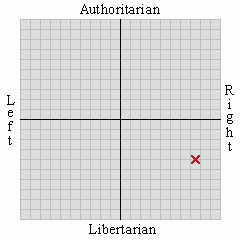Thought I'd end my hiatus with some economics that went through my head earlier.
Maternity leave can be defined as a payment for extra economic agents in the long term. As age increases, the utility of humans with regard to work decreases, so obviously childbirth is "replacement" of some sort.
So where does that leave us?
The question is 'should maternity leave be paid?', and I'll ignore the usual arguments, but instead ask, what benefit does it give in the long run? Does maternity leave encourage childbirth, of a child that may contribute more back to the economy in the future? Is there a net gain from paying maternity leave, childcare etc in the long run?
All very interesting stuff, but relies on some basic assumptions I suppose. Assuming that maternity pay is paid to mothers who were working, there should be some sort of culture of work in the family (or there is more likely to be), which (and I hate bringing up stereotypes, but) should count out the stereotypical 'council estate benefits sponger', so there's less likelihood of the child draining society (or the government coffers rather).
So, if n is the number of children, I could assume
monetary benefit n = n . average earnings - n . maternity pay
would be positive, and maternity pay would be a good thing, yes?
Then again, does maternity pay really benefit the child? And back to an early point, does it actually persuade mothers to have children?
Is this an argument for paying more benefits for those who work giving children? I'd disagree with anything like that since I don't think the state should behave in such a way, and I'm more convinced by the benefits of work than maternity pay in itself, which means an absence from work (and long term absence caused by it for the mother even?). But then again these crazy economic thoughts go through my head from time to time.
Subscribe to:
Post Comments (Atom)





No comments:
Post a Comment
Comment on posts here, and all posts whether critical or in agreement are fine as long as they are not abusive. Comments are moderated due to Chinese spambots.